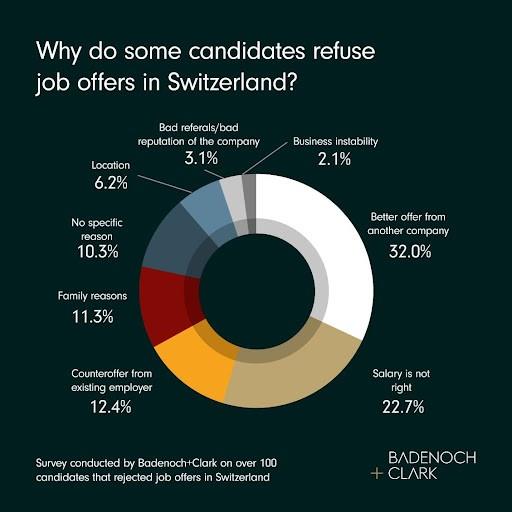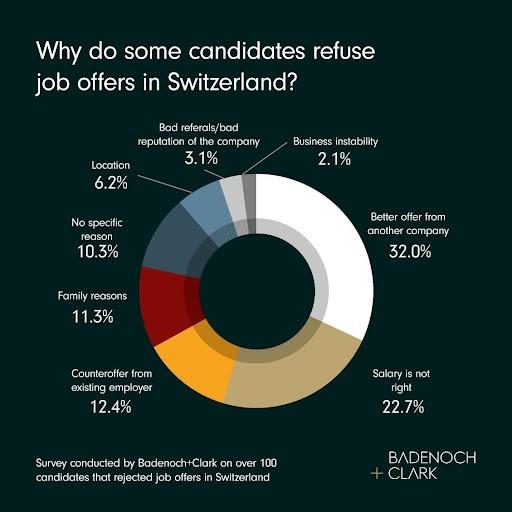Why some candidates refuse job offers in Switzerland

It happens. The perfect candidate says, “no”. It doesn’t happen often, but when it does it’s frustrating. It means starting the search all over again, which can be expensive and time consuming.
However, if you can understand why this happens then perhaps you can develop a strategy to prevent it from occurring again. The only way you can do this is to ask for feedback, but that’s not always easy to do.
So, we performed a study asking candidates in our network if they had refused an offer in the past 6 months and why. In total we received 97 responses.
The results were incredibly revealing. Some answers are obvious, but others weren’t. Without further ado, here are the results:

Two-thirds of refused offers were related to salary
Let’s begin with the obvious – what you offer really matters. Almost two-third of all candidates rejected offers because they accepted a better offer from another company. This is significant and it’s important to understand why this happens here in Switzerland.
To begin with, this is a candidate driven market. There’s long been a shortage of talent in Switzerland, and this has only got worse after the pandemic ended. The economic bounce back led to companies to compete fiercely to secure candidates. Naturally, there will be some rejections.
We are seeing talented candidates receive fantastic offers from multiple companies. In fact, these are often dream jobs. The problem is they can only accept one – the rest need to be rejected.
It’s hard saying goodbye
The other problem is that 12.7% of candidates stayed with their existing employer because they received a strong counteroffer. Again, this is tough to compete with. For candidates, the perceived safety of staying with their current employer might be too much of a pull.
The only option for a company is to offer an even better counteroffer, if the candidate gives them the chance to do so.
Money still matters a lot
This should be really obvious – money matters! From the candidates we interviewed, 22.7% stated that the salary was not right. Again, there is not much you can do here apart from offer the candidate a more attractive salary. However, there are limits and if a candidate has unrealistic expectations, there is not much you can do. Sometimes, you have to let the candidate walk away.
Overall, this is a trio of reasons that are all linked to earnings. When you add them together a whopping 67.1% of the candidates we interviewed rejected an offer due to reasons relating to pay.
Offers were also rejected due to work life balance and current circumstances
The story doesn’t end with salary, however. A third of candidates are also rejecting offers for a variety of other reasons relating to their work-life balance and current circumstances. One of the most interesting is because of family – 11.3% of the candidates we spoke to, cited this reason. Here, you need to dig deeper through conversations with these candidates.
The pandemic changed our perception of the world. During periods of lockdown, more attention was given to family. Some candidates rejected offers because they wanted the flexibility to spend more time with family. Flexible working could for instance allow a working father and mother to spend more time with their children. For some candidates, this is now more important to them than salary.
Of course, there are other reasons. Sometimes offers were rejected because suddenly circumstances changed – a child became ill, or an elderly parent needed care and attention for instance. The solution for preventing these types of rejections is simple – offer flexible working.
Reputation and stability
A company’s reputation (3.1%) and their stability (2.1%) were both also mentioned as reasons for rejection. Candidates take a risk when they leave and join a new company. If the company is a start-up, there is a risk that it will go bankrupt. Moreover, if the company has a bad reputation – a poor employer brand – this can also put off a candidate joining.
Location
Finally, there is location. An offer might have been rejected because the office is just too far away to travel to. Alternatively, this could be because there is a lack of flexibility to allow for some partial remote working during the week. The solution here is to make sure that this issue is resolved early on during the recruitment process. It can be as simple as just asking the candidate where they live and what the commute is like normally.
I think the takeaway here is that what you offer to a candidate really matters. Salary is important, but you also need to present yourself well to prevent candidates rejecting your offer to stay with their existing employer or to go with a competitor.
Sometimes there is nothing you can do. It’s just bad luck. The candidate has to just say no to someone because they already have too many good offers. Again, set expectations and plan your recruitment process well. I believe even here, some simple questions during the interview process can go a long way.
Just ask, “Are you interviewing anywhere else?”
It could save you a lot of time and frustration.